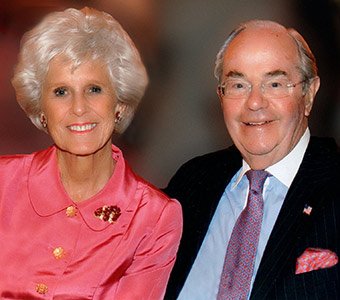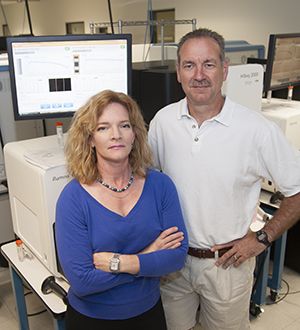
(Credit: Courtesy photo)
Longtime philanthropists and civic leaders James and Elizabeth McDonnell have pledged $25 million to endow The Genome Institute at Washington University School of Medicine in St. Louis.
The gift will fund innovative research to understand the genetic origins of diseases ranging from cancer and diabetes to autism and Alzheimer’s disease, with the aim of developing more effective diagnosis and treatment for patients.
With the gift, from the McDonnells and the James S. McDonnell (JSM) Charitable Trust, the institute will be named The Elizabeth H. and James S. McDonnell III Genome Institute.
“This extraordinary gift will enable our top-line researchers to set more ambitious goals and step up discoveries in the fast-paced world of genomics,” Washington University Chancellor Mark S. Wrighton said. “We are deeply grateful to Libby and Jim McDonnell and the JSM Charitable Trust for building on the university’s mission to advance human health in this transformative way.”
A major focus of discovery at The Genome Institute is on cancer, a disease that affects nearly one in every three people living in the United States. Scientists at The Genome Institute pioneered a comprehensive, genome-wide approach to unravel the genetic basis of cancer. In 2008, they became the first in the world to decode the genome of a cancer patient – a woman with leukemia – and identify the suite of genetic errors that contributed to her disease.
Since then, they have decoded the genomes of several thousand children and adults with cancer. This massive endeavor is leading to more targeted, personalized cancer treatments based on the unique genetic signature of a patient’s tumor.
Over the years, the McDonnells have provided hope to children and their families with generous support for pediatric research and treatment. In 2000, they joined with Anne and John F. McDonnell and the JSM Charitable Trust to provide funding that made possible the construction of the McDonnell Pediatric Research Building on the Washington University Medical Center campus. The building, a hub of pediatric research focused on numerous diseases, was dedicated in loving memory of the McDonnells’ daughter, Peggy, who died of cancer in 1972, at age 2.

“What appeals to us about The Genome Institute is its collaboration with St. Louis Children’s Hospital and Washington University School of Medicine’s Department of Pediatrics in the application of genomics to pediatric cancers,” James McDonnell said.
In addition, as part of a collaboration with St. Jude Children’s Research Hospital, Washington University launched the St. Jude Children’s Research Hospital-Washington University Pediatric Cancer Genome Project in 2010 to use next-generation genome sequencing to advance the understanding, diagnosis and treatment of some of the most aggressive and least understood childhood cancers. To date, the genomes of more than 700 young cancer patients and their tumors have been decoded.
“In particular, a focus of the Pediatric Cancer Genome Project is on neuroblastoma, which took the life of our daughter,” James McDonnell added.
The McDonnells’ generous support of the School of Medicine spans nearly five decades.
“Libby and Jim McDonnell have championed the medical school for many years, and this gift demonstrates their exceptional dedication to ensuring our success in many important areas,” said Larry J. Shapiro, MD, executive vice chancellor for medical affairs and dean of the School of Medicine.
“Libby and Jim’s philanthropy has spawned important scientific discoveries in nearly every pediatric discipline,” Shapiro added. “Moreover, their earlier generosity in endowing the Elizabeth H. and James S. McDonnell III Distinguished Professorship helped us recruit Dr. Dennis Hallahan, one of the great leaders in the study of cancers of the brain and central nervous system.”
In recent years, Genome Institute scientists have focused considerable efforts on identifying the genetic underpinnings of illnesses that affect children. In collaboration with physicians at St. Louis Children’s Hospital, they sequenced the genome of enterovirus D68, which circulated in St. Louis and beyond this fall and caused severe respiratory illness in young children.
They also have sequenced the DNA of babies with congenital anomalies that had unexplained causes, and the gut bacteria of premature babies with a potentially fatal condition called necrotizing enterocolitis. Nearly 30 percent of babies with the illness die, and researchers suspect that an imbalance of gut bacteria is a root cause.
“The McDonnells have championed pediatric research, and their support of our Genome Institute enables us to continue to search for cures to diseases by looking deep in the genome,” said Richard K. Wilson, PhD, the Alan A. and Edith L. Wolff Distinguished Professor of Medicine and director of The Genome Institute. “Their generous gift will help us make new discoveries to improve the lives of patients.”
The McDonnell family legacy in the field of genetics began with a gift in the late 1960s from James S. McDonnell, Jim’s father, to establish the McDonnell Medical Sciences Building, now the hub of basic science instruction on the Medical Campus. Another gift followed, in 1968, to endow the James S. McDonnell Professorship of Genetics. In 1975, a third gift created the James S. McDonnell Department of Genetics, one of the first departments in a school of medicine dedicated to the field of genetics.
The Genome Institute, founded in 1993 as the Genome Sequencing Center, played a key role in the Human Genome Project, an international effort to decode all 6 billion letters of our genetic blueprint. The institution ultimately contributed 25 percent of the sequence to the project, which was completed in 2003. Today, it is one of only three large-scale genome centers in the United States funded by the National Institutes of Health (NIH).
About James and Elizabeth McDonnell
James S. McDonnell III began his career in 1963 as an aerodynamics engineer at McDonnell Aircraft, the firm his father founded in 1939 in St. Louis and that later became McDonnell Douglas Corp. He held several managerial and executive positions at the corporation, and served as a vice president from 1973 until his retirement in 1991. He was a director of the corporation until its merger with the Boeing Co. in 1997.
His leadership involving the medical school is extensive. He is director of the board of the Children’s Discovery Institute, a joint initiative of the School of Medicine and St. Louis Children’s Hospital focused on early-stage research and treatment in pediatric care. He also sits on the board of St. Louis Children’s Hospital and serves on the School of Medicine National Council. He was recognized with the 2nd Century Award in 1998, which honors longstanding donors who help the School of Medicine enter its second century with strength and confidence.
A volunteer in the university’s Leading Together campaign, McDonnell has served on the boards of many St. Louis organizations, including the Municipal Theatre Association, the Missouri Historical Society and the Missouri Botanical Garden. Elizabeth McDonnell serves as a trustee of Hollins University and is a life member of the Washington University Women’s Society.